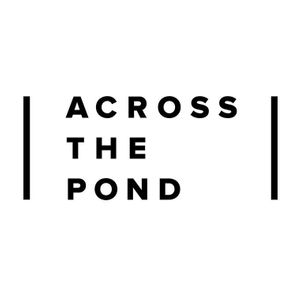
Trans+ Inclusion in the Workplace with Across the Pond

Today is Transgender Visibility Day. Anna Brent (she/her), has been in conversation with Marty Davies (they/them) and Jax Kenrick (they/them) - who boidentify as trans and non-binary.
Anna is global head of brand and DE&I at Across the Pond, Marty is founder of strategy first creative consultancy Smarty Pants and Jax is account director at Accenture Song. All three are on the board of directors of Outvertising, the not-for-profit LGBTQIA+ advertising and marketing advocacy group.
In light of the extensive and detrimental press coverage of trans rights in much of the mainstream press, and with the shocking murder in February of 16-year-old transgender girl Brianna Ghey in Warrington, there has never been a more important time for open discussion around inclusivity and the lived experiences of underrepresented people in the UK.
Today, Anna talks to Marty and Jax about some of the issues they have to deal with every day and how the marketing and advertising industry can step up and make the positive changes necessary to create a better represented and more equitable culture for everyone.
Anna> Have you generally had good or bad experiences at work because of your gender identity?
Jax> My last company was a workplace where there were already visible examples of trans representation. I was coming to terms with my identity and talking to my friends and family, so it was pretty easy to have that conversation at work too. I found that really positive. But for any sort of trans person, the flip side is that if you’re asking the people who know you, and maybe have worked with you for two or three years, to now use different pronouns - or, in some cases, different names – then there’s a learning curve. First impressions are hard to overcome, so, as inclusive as it was, I decided to leave that workplace and give myself a clean slate somewhere else.
Marty> For me, it has largely been positive – no doubt due to the privilege of working in creative industries in London and Amsterdam. That said, being misgendered – even when it’s unintentional – can really impact your work. If it isn’t noticed by the person doing it, it can throw you out of your body at the moment it happens – at least it does for me. It makes it hard for me to challenge it at that moment because actually I’m not present, I leave. That’s quite a tricky thing to deal with. It completely throws my train of thought and I lose my flow.
Jax> Unfortunately, discrimination is part and parcel of being a queer person, especially a trans person, in the workplace. Though being trans is not new, some of the language and education around trans people feels new to a lot of people. So, even in an industry like creative advertising or comms - where we consider ourselves more progressive and have clients with business agendas that have corporate social responsibility elements to them - we still come up against a societal lag, with non-trans people figuring out to behave and how to support a trans person at work. There’s a lot of work to be done by the trans community and our allies too to ensure we are creating a future in which the next generation of trans people don’t face quite as much discrimination in the workplace.
Anna> Have you found it hard to feel as if you are really being yourself at work?
Jax> I think there’s always a question, as a queer and trans person, over just how comfortable you are representing your authentic self in the workplace. In this industry, there is time pressure and a need to sometimes be perceived as someone who keeps all the wheels turning and doesn’t miss a beat. It can be overloading, and exhausting at times to have this other strand of yourself to manage – this other sphere to be conscious of.
Marty> Yes, for sure. I still feel pressure to code switch or mask – especially in roles where I’m coordinating multiple stakeholders. I’ve also really noticed that people are often walking on eggshells. There’s a feeling you get sometimes of pity, and people over-apologising to you. On the flip side I’m more myself at work than I’ve ever been and that has had a noticeable effect on my general confidence and presence, I’m much less of a people pleaser now.
Anna> Can you give us some ideas of how we can be better allies on a day-to-day basis?
Marty> Good allyship is being completely present for your trans and non-binary colleagues in any situation. There’s something I call ’conditional allyship’. For example, if I’m not in the room, and they’re in an important meeting, and I’m misgendered or referred to with the wrong name, some people don’t feel comfortable correcting, because they don’t want to disrupt the flow or feel like they’re telling somebody off.
That’s quite a challenge, because when your trans colleague isn’t in the room you’re probably using their name and pronouns more, so correcting people really helps to bake in that inclusion, stop that misgendering, and demonstrate consistent – rather than conditional – allyship.
Jax> I think everything around pronoun sharing is really important in your day-to-day, and respecting names. A lot of progress has been made in including this in emails, for example, but for video calls it’s less common. Most of them have fields for you to self-identify your name and pronouns, so those should be adopted and used. Even if you’re making introductions in a meeting with a lot of people you’ve not met before, it’s common to state names and roles – and the same applies when you make decks or slides to introduce a team. Isn’t it somewhat ludicrous that we’re not also including the pronouns by which everyone wants to be addressed?
Marty> Having gone from identifying as a gay man to a trans person, I feel the difference in how workplaces and workplace policies are currently better serving the LGB than the T. You can feel exclusion through omission - lack of transitioning policy, lack of gender expression policy, gender neutral bathrooms, lack of pronouns being encouraged. And, name change policy - it’s focused on name changes for people who get married, in this scenario accidental exposure of your former name in workplace systems and documents is less of a sensitive issue. For a trans person you’re revealing their deadname, you may be inadvertently outing them to newer employees.
Jax> Public bathrooms have unfortunately been dramatised to an unhealthy and dangerous extent by some media and government narratives at the moment. What drives a lot of those narratives is a legitimate fear of male violence that is shared by both cis gender women and trans people of all descriptions. That same fear of male violence also makes it very difficult for trans - especially transfem people - to feel comfortable using male bathrooms because they don’t feel like it’s a safe space. So you can’t overstate the importance of gender-neutral bathrooms in any work space, whether it’s for trans people that already exist in your organisation, or suppliers and clients coming in whose gender identity you don’t know. It is something that should be considered when you are choosing or building a new workspace for your company.
Anna> And what about wider changes you’d like to see, in terms of management and the workplace itself?
Marty> Just having policies for the trans+ community would be a start. There’s often a lack of inclusive policies relating to transitioning, gender expression, name changes and bathrooms as mentioned. There’s the argument that if a business only has a small number of trans+ people it’s better to do things on a case-by-case basis than have a policy. But that means that you’re not actually promoting the fact that you have these resources available, which impacts employees who need them, as well as potential employees.
From the C-suite, we really need to see more attention being given to broader inclusion efforts. Inclusion is what drives the retention of employees, especially across advertising agencies - we all know the turnover rate of employees is very high. If you are including people properly, everyone can actually bring their full authentic selves to work, which means your focus and mental energy is not being place toward code switching, and you can put your full effort and intellectual and creative energy into your work and ultimately perform well for the business and contribute to a business succeeding
Anna> Tell us a bit more about your trans+ community group.
Marty> It’s a group for trans, non-binary, gender non-conforming and intersex people across advertising and marketing, and adjacent industries.
Jax and I met at a similar time in our gender journey. I didn’t know anyone else who was trans or non-binary in advertising and marketing, and I’d never felt more lonely at work. I really wanted that community. It’s all about connecting, celebrating each other, sharing frustrations, and organising. It’s helpful to have a space to articulate an experience you are having and not have to over explain it or be challenged about feeling that way because everyone in that space understands.
And people in our community have used it as a way to try new names for themselves and express new pronouns and ways of presenting themselves before wanting to take that further. It’s a nice safe environment to feel celebrated and supported into your real authentic self, and to explore and experiment – and that, I find, really incredible and a special thing to be a caretaker of.
Anna> How can any trans+ people reading this join?
Jax> We’d love people to reach out to us via LinkedIn.
---
Interested in reading more? See Jax’s piece on fear mongering and misinformation in the media by loud anti trans voices, and this article by Marty, making the connection between adspend and LGBTQIA+ hate spend.
Outvertising has also published Employer Guidance to support LGBTQIA+ inclusion in the workplace, which is a free resource aimed specifically at the advertising industry.













